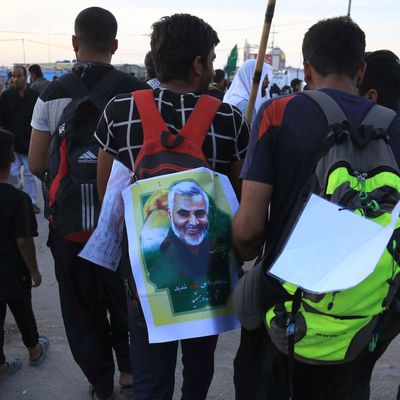
Early on Friday in Baghdad, U.S. forces killed Major General Qasem Soleimani in an air strike at the Baghdad International Airport in order to “protect U.S. personnel abroad,” according to the Pentagon. The attack on Soleimani, considered Iran’s most important military leader, was carried out “at the direction of the president.” Soleimani was the head of Iran’s Quds Force, a unit of the Islamic Revolutionary Guard Corps responsible for clandestine operations abroad and for providing material support to groups like Hezbollah, Hamas, and the Popular Mobilization Forces, an umbrella organization for Iraqi militias, whose deputy leader Abu Mahdi al-Muhandis was also reportedly killed in the attack, along with five others.
The Pentagon misstated the name of the IRGC: It is the Islamic Revolutionary Guard Corps, not the Iranian Revolutionary Guard Corps.
The strike is likely to escalate the tension between the two powers currently engaged in proxy skirmishes in Iraq. Last week, the United States claimed that an Iranian-backed militia fired rockets into an American base in Kirkuk Province north of Baghdad, killing an American contractor. In response, U.S. forces bombed three sites of an Iranian-backed militia in western Iraq, killing several fighters. On Tuesday, protestors linked to pro-Iranian militias then stormed at the American Embassy in Baghdad, breaking past guards and forcing diplomats to stay locked inside for over 24 hours.
And on Thursday, Secretary of Defense Mark Esper issued a stern warning: “If we get word of attacks, we will take pre-emptive action as well to protect American forces, protect American lives. The game has changed.” Shortly after the death of Soleimani, reports also emerged that U.S. marines captured two leaders of pro-Iranian militias in Iraq: Qais Khazali of Iraqi Hezbollah and Hadi Al Ameri, the alleged head of the Badr organization, the military wing of the Supreme Islamic Iraqi Council.
Soleimani, 62, became head of the Quds Force in the late 1990s, leading the group’s operations in Syria and Iraq, where it was responsible for the deaths of hundreds of American soldiers during the Iraq War. He was also considered a major force guiding Hezbollah in the past few decades, and helped Iraqi forces push back ISIS fighters during the civil war.
Supporters of the president promptly weighed in approving the action and condemning Soleimani, while Trump simply posted a picture of a blurry flag:
Though the Pentagon cited the attack as an example of deterrence, politicians, reporters, and experts on the region are expecting the opposite:
Democratic candidates for president began to weigh in late on Thursday night in the U.S. “Soleimani was a murderer, responsible for the deaths of thousands, including hundreds of Americans,” tweeted Elizabeth Warren. But this reckless move escalates the situation with Iran and increases the likelihood of more deaths and new Middle East conflict. Our priority must be to avoid another costly war. Joe Biden wrote that “President Trump just tossed a stick of dynamite into a tinderbox, and he owes the American people an explanation of the strategy and plan to keep safe our troops and embassy personnel, our people and our interests, both here at home and abroad, and our partners throughout the region and beyond.” And Bernie Sanders stated that “Trump’s dangerous escalation brings us closer to another disastrous war in the Middle East that could cost countless lives and trillions more dollars. Trump promised to end endless wars, but this action puts us on the path to another one.
This is a breaking-news post and will be updated.






























